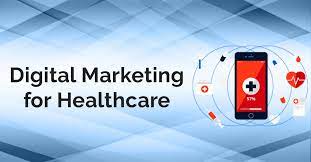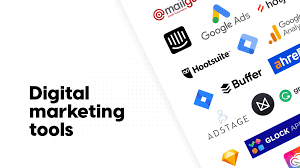The Impact of Digital Marketing in Healthcare
In today’s digital age, the healthcare industry is leveraging the power of digital marketing to reach and engage with patients in innovative ways. Digital marketing has revolutionised how healthcare providers connect with their target audience, improve patient outcomes, and enhance overall healthcare experiences.
Benefits of Healthcare Digital Marketing
Digital marketing offers numerous benefits to healthcare organisations:
- Increased Patient Engagement: Through social media, email campaigns, and online content, healthcare providers can engage with patients on a more personal level, providing valuable information and building trust.
- Enhanced Brand Awareness: Effective digital marketing strategies can help healthcare organisations increase their visibility and establish a strong brand presence in the competitive healthcare landscape.
- Precise Targeting: Digital marketing allows healthcare providers to target specific demographics and tailor their messages to reach the right audience at the right time.
- Data-Driven Insights: By analysing digital marketing data and metrics, healthcare organisations can gain valuable insights into patient behaviour, preferences, and trends, enabling them to make informed decisions.
- Improved Patient Education: Through online resources such as blogs, videos, and webinars, healthcare providers can educate patients about various health conditions, treatments, and preventive care measures.
The Future of Healthcare Digital Marketing
As technology continues to advance rapidly, the future of healthcare digital marketing holds even greater potential. From personalised medicine to telehealth services, digital marketing will play a crucial role in shaping the future of healthcare delivery and patient engagement.
Seven Essential Tips for Effective Healthcare Digital Marketing
- 1. Utilise social media platforms to engage with your audience and share valuable healthcare information.
- 2. Create a user-friendly website that is mobile-responsive for easy access on different devices.
- 3. Implement SEO strategies to improve your online visibility and attract more potential patients.
- 4. Develop informative and visually appealing content such as blogs, videos, and infographics to educate your audience.
- 5. Use email marketing campaigns to stay connected with patients, promote services, and share relevant updates.
- 6. Collaborate with influencers or healthcare professionals to reach a wider audience and build credibility.
- 7. Monitor analytics regularly to track the performance of your digital marketing efforts and make data-driven decisions.
1. Utilise social media platforms to engage with your audience and share valuable healthcare information.
Utilising social media platforms is a valuable tip in healthcare digital marketing to effectively engage with your audience and share important healthcare information. By leveraging the reach and interactivity of platforms such as Facebook, Twitter, and Instagram, healthcare providers can connect with patients on a more personal level, foster trust, and deliver relevant content that educates and empowers individuals to make informed health decisions. This proactive approach not only enhances patient engagement but also strengthens the provider-patient relationship, ultimately leading to improved health outcomes and a more connected healthcare community.
2. Create a user-friendly website that is mobile-responsive for easy access on different devices.
Creating a user-friendly website that is mobile-responsive is a crucial tip in healthcare digital marketing. In today’s mobile-centric world, patients expect easy access to healthcare information and services on their smartphones and tablets. A mobile-responsive website ensures that users can navigate the site seamlessly on various devices, providing a positive user experience and encouraging engagement. By prioritising mobile responsiveness, healthcare providers can reach a wider audience and enhance patient satisfaction with convenient access to valuable health resources.
3. Implement SEO strategies to improve your online visibility and attract more potential patients.
Implementing SEO strategies is essential in healthcare digital marketing to enhance online visibility and attract a larger pool of potential patients. By optimising your website with relevant keywords, creating high-quality content, and improving your site’s technical aspects, you can increase your search engine rankings and make it easier for patients to find you online. SEO not only helps drive organic traffic to your website but also establishes your authority in the healthcare industry, ultimately leading to more patient inquiries and appointments.
4. Develop informative and visually appealing content such as blogs, videos, and infographics to educate your audience.
To enhance your healthcare digital marketing strategy, it is essential to develop informative and visually appealing content, including blogs, videos, and infographics. By creating engaging content that educates your audience about various health topics, treatments, and preventive care measures, you can establish credibility, build trust with patients, and differentiate your brand in the competitive healthcare landscape. Visual elements such as videos and infographics can make complex medical information more digestible and engaging for your audience, leading to increased patient engagement and improved overall healthcare experiences.
5. Use email marketing campaigns to stay connected with patients, promote services, and share relevant updates.
Utilising email marketing campaigns is a valuable strategy in healthcare digital marketing to maintain a strong connection with patients, promote services effectively, and share pertinent updates. By sending targeted and informative emails, healthcare providers can keep patients engaged, informed, and aware of the latest developments in healthcare services. This approach not only enhances patient communication but also helps to build trust and loyalty towards the healthcare organisation.
6. Collaborate with influencers or healthcare professionals to reach a wider audience and build credibility.
Collaborating with influencers or healthcare professionals is a strategic tip in healthcare digital marketing to expand reach and establish credibility. By partnering with individuals who have a strong influence in the healthcare industry, organisations can tap into their existing audience base and leverage their expertise to engage with a wider demographic. This collaboration not only helps in reaching a larger audience but also enhances the brand’s credibility and trustworthiness, as it is endorsed by respected figures within the healthcare community. Leveraging influencers or healthcare professionals can significantly boost visibility and foster stronger connections with patients and stakeholders in the digital space.
7. Monitor analytics regularly to track the performance of your digital marketing efforts and make data-driven decisions.
Monitoring analytics regularly is a crucial tip in healthcare digital marketing. By tracking the performance of your digital marketing efforts through data analysis, you can gain valuable insights into the effectiveness of your strategies. This data-driven approach allows healthcare providers to make informed decisions, optimise campaigns, and adjust tactics to better engage with patients and improve overall outcomes. Regular monitoring of analytics ensures that your digital marketing efforts remain aligned with your goals and continually evolve to meet the changing needs of your target audience.


